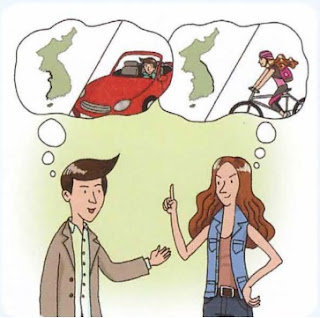가: 이번 여름에 해안선을 따라 여행을 해 볼까 하는면 동해안 쪽이 좋아요, 서해안 쪽이 좋아요?
This summer, I’m planning to take a trip along the coast, but which is better, the east coast or the west coast?
나: 글쎄요. 동해안은 동해안대로 서해안은 서해안대로 각각 매력이 있어서 어디 한 곳을 말하기가그러네요. 자동차로 가려고요?
Well, both the East Coast and the West Coast have their own respective appealing aspects, so it’s hard to say one over the other. Are you planning to go by car?
가: 아니요, 지금 계획은 자전거로 갈까 하는데 무리 일까요?
No, my current plan is to go by bicycle, but I wonder if that’s out of the question.
나: 자동차를 타는 것보다는 시간도 오래 걸리고 힘들겠지만 자전거는 자전거대로 천천히 자연을 느끼면서 여행할 수 있어서 좋을 것 같아요.
Rather than going by car, and while it may take more time and be more physically taxing, going by bicycle has its own benefits, like being able to experience nature at a slower pace as you go on your journey, so I think that’s a good choice.
-은/는대로 is used with nouns to indicate that each noun has its own different characteristics with respect to the content that follows.
• 너는 너대로 나는 나대로 어디에 있든지 최선을 다하면 되는 거야.
You have your way, and I have my way, so wherever we are, we’ll be fine as long as we do our best.
• 요즘도 남자는 남자대로 여자는 여자대로 따로 밥을 먹어야 하는 곳이 있단 말이에요?
Is it true that even now there are places where men must eat with men and women with women separately?
• 같은 재활용 쓰레기라도 종이는 종이대로 플라스틱은 플라스틱대로 분리해서 버려야 해요.
Even within the same recyclable waste, paper goes with paper, and plastic goes with plastic, so it must be separated and then thrown away.
>> You can click on the title of grammar below to see another grammar that also expresses ‘Doing Things Separately and Together’
>> Full of ‘Korean grammar in use – Advanced’: Click here
>> Full of ‘Korean grammar in use – Intermediate’: Click here

